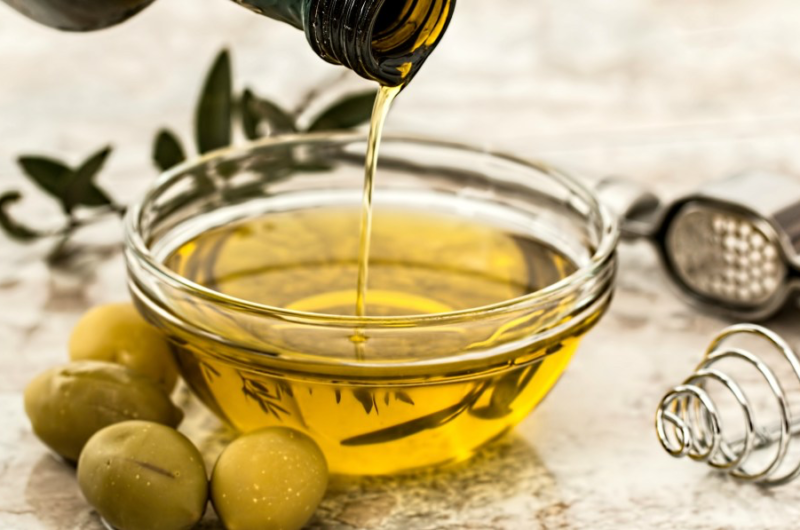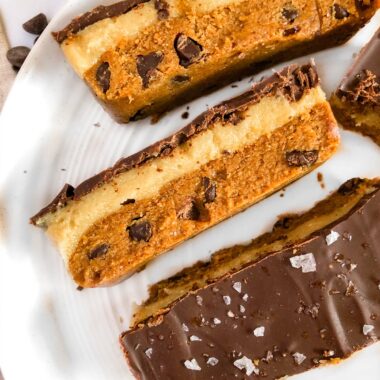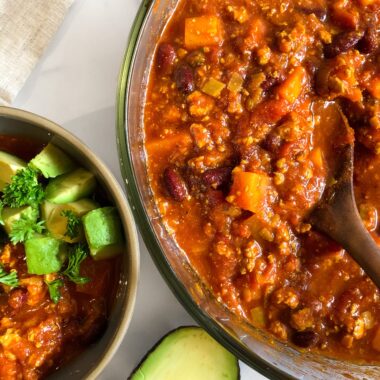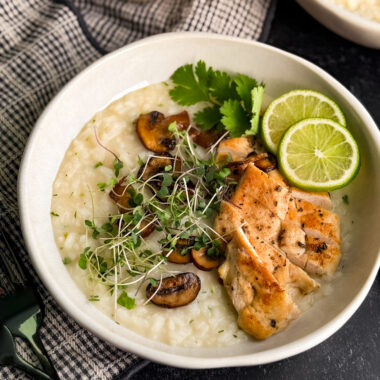This post may contain affiliate links, which means I make a small commission off items you purchase at no additional cost to you. Please read my disclaimer page.
Considering how passionate I am about eating plenty of healthy fats, I am also passionate about properly used healthy fats. It’s great to make sure that you’re eating healthy fats (which you should do!), but they unfortunately become unhealthy fats if you are denaturing them. So let’s summarize what oils are safe for heat exposure and which ones are not.
Safest for high-heat cooking
(Withstands above 400ºF in the oven and sustained medium-high heat or temporary high heat on the stove)
- Ghee from grass-fed cows – Ghee is a great alternative for those sensitive to butter because it doesn’t have the casein proteins. Tolerates up to 450ºF.
- Naturally refined avocado oil – Be careful here! Not every refined oil is good (In fact, industrial refining is very bad – you’ll learn why later), but the naturally refined avocado oil created without solvents, chemicals, extreme heat, etc. is fine. Chosen Foods and Primal Kitchen are good brands (I particularly like Chosen Foods avocado oil because they explain in depth how they produce it!). Tolerates up to 500ºF. Great to use for everything from oven, stovetop, grill, etc.
- Tallow – It should be from grass-fed cows. Tolerates up to 420ºF.
- Red palm oil (this is different from palm kernel oil) – It’s very important to make sure it’s sustainably and ethically harvested, as well as organic and virgin. Tolerates up to 450ºF.
Safe for lower heat cooking
(Baking at or below 400ºF, stovetop cooking at or below medium-high heat – A general rule of thumb for the stove is to not go above med-high for longer than a few minutes. Stick with medium or below for most of the cooking.
- Olive oil – Buy extra virgin and cold-pressed. Best at or below 400ºF.
- Unrefined Avocado Oil – Cold-pressed or expeller-pressed. Best at or below 400ºF (this one is different from the one on the page before)
- Macadamia Nut Oil – Buy unrefined and cold-pressed. Best at or below 400ºF.
- Coconut Oil – Buy organic and virgin (unrefined) – Stay below medium heat in a skillet (350ºF). It can tolerate more inside baked goods (375ºF) because it’s contained within a food rather than directly on a skillet.
- Butter from grass-fed cows – Preferably raw butter (pasteurization denatures many of the nutrients and enzymes). Stay below medium heat in a skillet (350ºF). It can tolerate more inside baked goods (375ºF) because it’s contained within a food rather than directly on a skillet.
- Sesame Oil – Buy unrefined and cold-pressed. Stay below medium heat in a skillet and 350ºF in the oven.
Unsafe for any heat exposure
- Flax oil
- Hemp oil
- Pine nut oil
- Pumpkin seed oil
- Almond oil
- Walnut oil
These oils are primarily composed of PUFAs, so should not be heated. If you do wish to consume these oils, do so in small doses. They should always be bought and kept in airtight, ultraviolet glass bottles that are refrigerated. These oils are extremely healthy, but also highly unstable and therefore go rancid very easily. PUFA dominant oils should never be refined or processed, and unfortunately, finding truly unprocessed versions of these oils can be a difficult task.
Now that I have gone over most of the oils that are healthy and which can and cannot be used for cooking, I am going to list oils that should be completely avoided.
The oils you should avoid completely
These are industrial seed oils, which should always be avoided.
- Canola oil (also called rapeseed or mustard seed)
- Vegetable oils, corn oil, and soybean oil
- Vegetable shortening
- Margarine / butter alternatives
- Cottonseed oil
- Safflower oil
- Rice bran oil
- Hydrogenated oils (avoid both partially and fully hydrogenated)
- Trans fats
These industrial seed oils oxidize very easily. Oxidation occurs when the oil reacts with oxygen, which chemically alters the oil. Cooking with vegetable oils releases high concentrations of harmful compounds and toxic chemicals, such as aldehydes (a result of degradation of the fatty acids in oils), which have been linked to diseases, including arthritis, heart disease, dementia, and cancer. These oils also are high in omega-6, which are inflammatory (compared to omega-3’s and omega-9’s which are anti-inflammatory). Many Americans eat far too many omega-6’s and far too little omega-3’s and omega-9’s. In addition, cotton, soy, and corn are some of the most genetically modified, pesticide-laden crops in America, and the oil form has a concentrated amount of those pesticides. It’s important to read ingredient labels to avoid these oils. There are plenty of healthy brands on the market that don’t use these oils, and it is easy to replace these in your home with healthier options for cooking your meals.
How Are Industrial Seed Oils Made?
The general process used to create industrial seed oils is very concerning. The oils extracted from soybeans, corn, mustard seed, cottonseed, safflower seeds, and rapeseeds must be refined, bleached, and deodorized before they are considered suitable for human consumption.
- First, seeds are gathered from the soy, corn, cotton, safflower, mustard seed, and rapeseed plants.
- Next, the seeds are heated to extremely high temperatures to release the oil; this causes the unsaturated fatty acids in the seeds to oxidize, creating byproducts that are harmful to human and animal health.
- The seeds are then processed with a petroleum-based solvent, such as hexane, to maximize the amount of oil extracted from them.
- Next, industrial seed oil manufacturers use chemicals to deodorize the oils, which have a very off-putting smell once extracted. The deodorization process produces trans fats, which are well known to be harmful and inflammatory.
- Finally, more chemicals are added to improve the color of the oils.
Altogether, industrial seed oil processing creates a nutrient-devoid oil that contains chemical residues, trans fats, and oxidized byproducts.
So obviously, the types of oils we consume will make a significant impact on our health! To heal our gut (and therefore every aspect of health), we want to avoid these inflammatory oils. Avoiding these oils will transform your health and reduce inflammation in your body very quickly. Unlike the industrial seed oils, the natural oils listed on the next page are not only pure, but are more resistant to oxidizing. Therefore, they increase our health rather than cause inflammation and oxidative stress.
Healthy Oils Guide
| HEALTHY OIL | IDEAL SOURCING | HEAT TOLERANCE | BRANDS |
|---|---|---|---|
| Avocado Oil (naturally refined) | Pure, naturally refined without solvents or chemicals | High / 500ºF | Chosen Foods, Primal Kitchen |
| Ghee | Grass-fed cows | High / 450ºF | 4th & Heart, Pure Indian Foods, Tin Star, Ancient Organics, Vital Ghee |
| Red Palm Oil | Unrefined and organic. Make sure it’s ethically and sustainably sourced! Also be aware it is red, so it’ll give food a slightly red color | High / 450ºF | Wildly Organic, Pure Indian Foods, Nutiva |
| Tallow | Grass-fed cows | High / 420ºF | Fatworks, U.S. Wellness Meats, Epic, a local rancher |
| Avocado Oil (unrefined) | Unrefined, cold or expeller pressed | Medium-High / 400ºF | Avohass, Bellavado, Chosen Foods |
| Macadamia Nut Oil | Unrefined and cold-pressed | Medium-High / 400ºF | House of Macadamias, Ellyndale Naturals, Roland, Olivado |
| Olive Oil | Extra virgin, unrefined, cold-pressed | Medium-High / 400ºF | Kasandrinos, Jovial, California Olive Ranch |
| Chicken Fat (Schmaltz) | Pasture-raised chickens | Medium / 375ºF | Fatworks, U.S. Wellness Meats, a local rancher |
| Duck Fat | Pasture-raised ducks | Medium / 375ºF | Fatworks, U.S. Wellness Meats, Epic, a local rancher |
| Pork Fat (Lard) | Pasture-raised pigs | Medium / 370ºF | Fatworks, U.S. Wellness Meats, Epic, a local rancher |
| Butter | Grass-fed cows. Bonus if it’s raw from a local rancher! | Medium / 350ºF | Kalona Supernatural, Kerrygold, Vital Farms, Kirkland |
| Coconut Oil | Organic and virgin (unrefined) | Medium / 350ºF | Tropical Traditions, Nutiva, Alpha DME |
| Sesame Oil | Unrefined and cold-pressed | Medium / 350ºF | Wildly Organic, Pure Indian Foods, Flora Health |
So, which oils should YOU choose?
Any of the safe oils listed are a great choice to have in your kitchen! Choose them based off your preferences / cooking needs / accessibility. I know it seems like a lot to choose from, though, so I’ll tell you about my personal go-to’s:
- Chosen Foods Avocado Oil – Great for any cooking and baking needs (replace any vegetable oils with this 1:1). Costco carries this in bulk, and you can also buy it in bulk on their website (saves $$!)
- Kasandrinos Extra Virgin Olive Oil – Great for lower heat cooking, as well as to use as a finishing, or in dressings, pesto sauce, etc.
- Grass-Fed Butter and Ghee – Butter is great for baking, lower heat cooking, and as a topping for many things (like sourdough toast!). Ghee is great for high-heat cooking and baking. Plus, homemaking ghee is super easy!
- Fatworks Grass-Fed Tallow – Great for high-heat cooking with savory meals.
- Unrefined Coconut oil (Tropical Traditions and Nutiva are my go-to brands to purchase from) – Great for baking or in smoothies for healthy fats.
- House of Macadamias Macadamia oil – Great for medium-high heat and as a fun, unique oil to use for a different flavor and nutrient profile.
The big takeaway:
The industrial seed oils should be avoided, while the oils listed as safe should be embraced! With that said, be sure to either purchase the brands I listed, or carefully read the labels of the oils you purchase to make sure it is properly sourced and from a trusted company. Unfortunately, there aren’t many regulations on oils and how they are produced, so not every brand is great. Print out the guide on page 6 to bring with you the next time you shop for oils!
Resources:














Pingback: The Benefits of Dietary Fat » Home Cooked Living
Pingback: The Benefits of Dietary Fat » Home Cooked Living